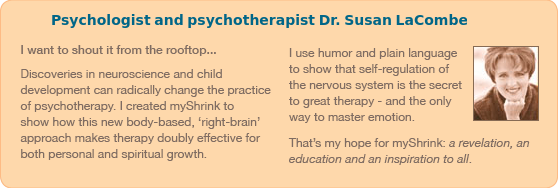If you have an overabundance of shame pathways, you're going to find yourself easily embarrassed.
Yes, you'll turn red at the drop of a hat.
It doesn't have to be that way. Your brain can change.
Are you easily embarrassed? Here's why.
I've never had a client come in to see me for counseling saying that they have difficulties with "managing their shame". But shame actually represents one of the underlying reasons many people enter counseling for--they just call it by another name.
You see shame makes it hard to connect with others and to assert ourselves.
If there is one aspect of our lives that holds us back from feeling the wonder of life, from exercising our power and from connecting with others, it's shame.
Try to recall the last time you felt embarrassed...
Remember in that split second you felt it flash across your face? It was crushing. You probably wanted to dig yourself a big hole and crawl in. Well, you're not alone. This is a common human experience. No one escapes feeling shame in their life.
Have you noticed that when someone is feeling shame and you notice it, you feel shame also? How you react to their shame can reveal how you typically react to your own shame.
For example, did you laugh? Did you recoil? Were you able to stay connected with the person?
As an aside, the flushing we experience is the discharge. It is believed to arise from the sudden drop in the activation.
Shame is actually extremely useful. Evolutionary-speaking shame has helped the human species survive. It makes us curtail certain behaviours so we will be accepted within the social group. We have more chances of staying alive this way. If we stay within the group we have more protection from enemies and harsh environmental conditions.
So you see we're wired for shame. (It keeps most of us toilet trained.) But seriously, shame has important implications for our health.
Shame Causes Stress
What many people are unaware of is that shame is a "microstressor"1 that triggers the stress response in our body. Cortisol, the stress hormone, is released in the same way as if you just faced a stressful event like finding out the deadline for a work project is sooner than anticipated.
Overdeveloped shame pathways can potentially keep you triggered into the stress response all day long. Furthermore, if you have a lot of shame in your emotional makeup it will compound any external stressors you are feeling.
Too many shame pathways lead to one's face turning red at the slightest provocation. You can easily imagine how this sensitivity would inhibit risk taking and showing up in one's life.
Fortunately, the brain is very plastic. We can train our nervous system to manage shame activation. And with practice it will do so more efficiently and therefore will less likely trigger the stress response.
Shame and Counseling
It is important to be aware of the feelings of shame that arise in your counseling. In the clinical work that I do, I encourage clients to feel shame as it arises. In order to develop new pathways and for the activation associated with the shame to move through the body, we actually need to feel it in the moment.
By staying with the sensation of shame you are creating a new way for your brain to process it, to manage the energy associated with it. Your nervous system is learning. In the presence of a regulated individual you provide the means for your brain to find a new pathway to channel the energy through.
In a safe relationship with your therapist, you will find yourself speaking of your life and it is natural that shame will arise. It's just human that it would be so. The therapist that encourages you to stay in the sensation allows the shame to be metabolized. More... (Click open the question, "What's the hardest thing about being a therapist.")
My Personal Musings
How do we get too many shame pathways?
Freezing in the face of trauma is one source. However I believe most theorists would agree that it usually develops through our attachment relationships with our parents.
It's pretty hard for parents who have a lot of shame to avoid passing it on to their kids. Shame is experienced automatically. It is controlled by a part of the brain we have little conscious control over.
The less shame in your nervous system the less likely you will model it in front of your children. So I encourage you to keep up your counseling--one of the best ways of reducing shame--and avoid passing this heartache on to your kids!
Shame is probably the biggest deterrent to counseling.
Sadly the very reason one might want to enter counseling is often the very thing that keeps people away. I suspect they feel the shame underneath and don't feel quite prepared to face it.
Furthermore, if they are caught up in all the myths around counseling (i.e. I will be pushed into saying something or doing something I don’t want) then they likely will never give it a try. (See My Psychic Therapist and other Myths for more on this subject.) The irony is that the very thing that holds them back is the very thing that could make counseling so worthwhile.
It's my hunch that many of my failures--clients who came to see me for only one session--were because I did not provide the right interventions for the shame they felt. Finding the right therapist is understandably very important when someone is filled with shame.
related reading
How shame is reduced in Counselling
references
Schore, Allan (2003). Affect Regulation and Repair of the Self. "Early Superego Development: The Emergence of Shame and Narcissistic Affect Regulation in the Practicing Period." New York: W.W. Norton & Company, pp. 151 - 186.
On p. 155. Schore draws on developmental research, clinical observations and neurobiology to illustrate how shame first develops in what is known as the practicing stage (10-12 to 16-18 months).
Notes
1 As quoted pg. 180 in Schore above: "microstressor" from Panksepp, J., S iviy S. M., & Normansell, L. A. (1985) Brain opiods and social emotions. In M. Reite & T. Field (Eds), The psychobiology of attachment and sparation (pp. 3-49). Orlando, FL: Academic Press.

Reader's Comments

DS
I have kept my shame from him all this time
I really liked reading about shame. I just confided in my shrink that I have kept my shame from him all this time (in therapy 18yrs. with him). I felt really bad and told him I haven't been honest with him, but that until now I could not talk about it. I just opened up the subject, but told him I could not yet talk about details.
He was really quiet, but then again he often is because I lie on a couch with him behind me. Don't know what will happen next week and I am already freaking out. I have BPD traits
DS (Quebec, Canada)

Shrinklady
I think that's fantastic DS that you've opened up to your therapist. I can imagine though, how tough it must feel to have had a quiet response. Shame is a socially embedded emotion and needs the healing force of the company of others.
I also know though that unless it's brought out, it can never be changed. And now you've taken that step. It seems by your gesture that you are wanting to make things different for yourself.
I'd be tempted - if you dare - to talk to your therapist about what you're wanting to have different in your therapy. I would bet as you're doing so (fear aside), you'd be making your therapy deeper and more transformative.
Wishing you all the very best,
Shrinklady
P.S. You might even want to talk to your therapist about what's possible for you post-therapy and beyond.

Jonathan
Ironically, I don't want to be cured
I suffer from an extremely socially unacceptable sexual perversion (voyeuristic coprophilia) and for my entire life I have been deeply ashamed. I won't discuss this perversion with a psychiatrist because the experience would be too intensely shameful and humiliating; furthermore, discussing it might somehow taint the perversion itself.
Ironically, I don't want to be cured of my shameful fantasies. That would mean losing my greatest source of pleasure. How would a normal heterosexual male enjoy being cured of his desire for intercourse?
Jonathan (toronto, canada)

Helen
Should I go back to this therapist?
I went to therapy for about 5 months with a great Psy.D. Part of my issue was/is dealing with the pain of early childhood trauma. (shame). Early into therapy transference crept in, but I don't have a handle as to why or where it was coming from. I was a bit too preoccupied with my therapist. This was briefly addressed in therapy, but I was not ready to deal with it, so it was dropped. I did get the impression that he could/would deal with it, but I am afraid. (IDK why)
I have stopped going to therapy, but many things were left unfinished. He is all of the things you say a good therapist should be, and I now want the benefits of working through this stumbling block.
My question - should I go back to this therapist, or find another one?
helen (NJ, USA)

Shrinklady
Hello Helen, my heavens, I would definitely reconnect. If the therapeutic bond was such that transference arose, I would take this as a great opportunity. That your therapist appears to be a good one, is also a good sign.
And now, maybe you're ready for working things through and figuring out the IDK why.
Being afraid is part of the process. Take your time and as you feel comfortable the risks will feel doable.
Good luck in your work,
Shrinklady

J
Very well communicated information. Very understandable
J (LAKE OSWEGO, USA)

